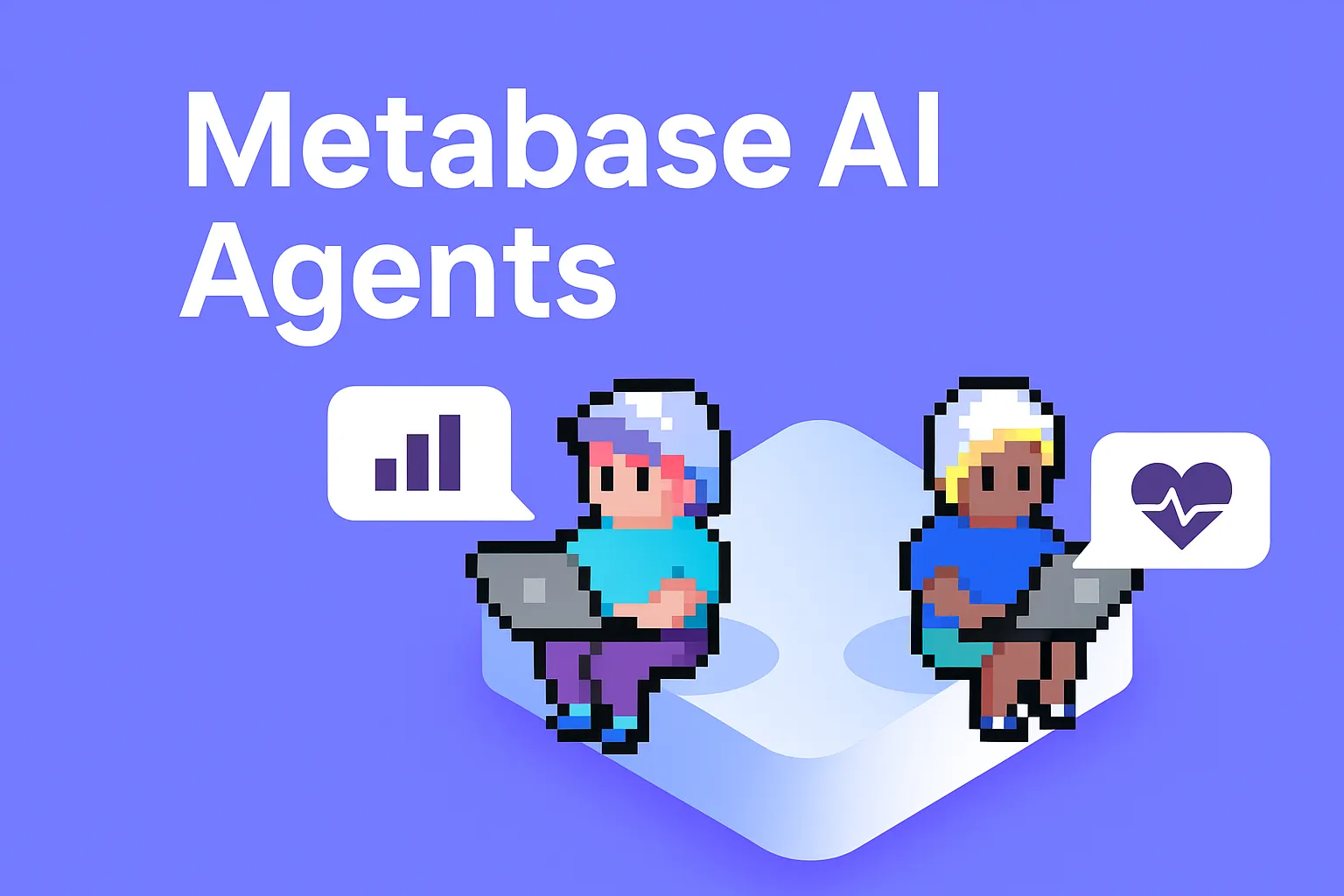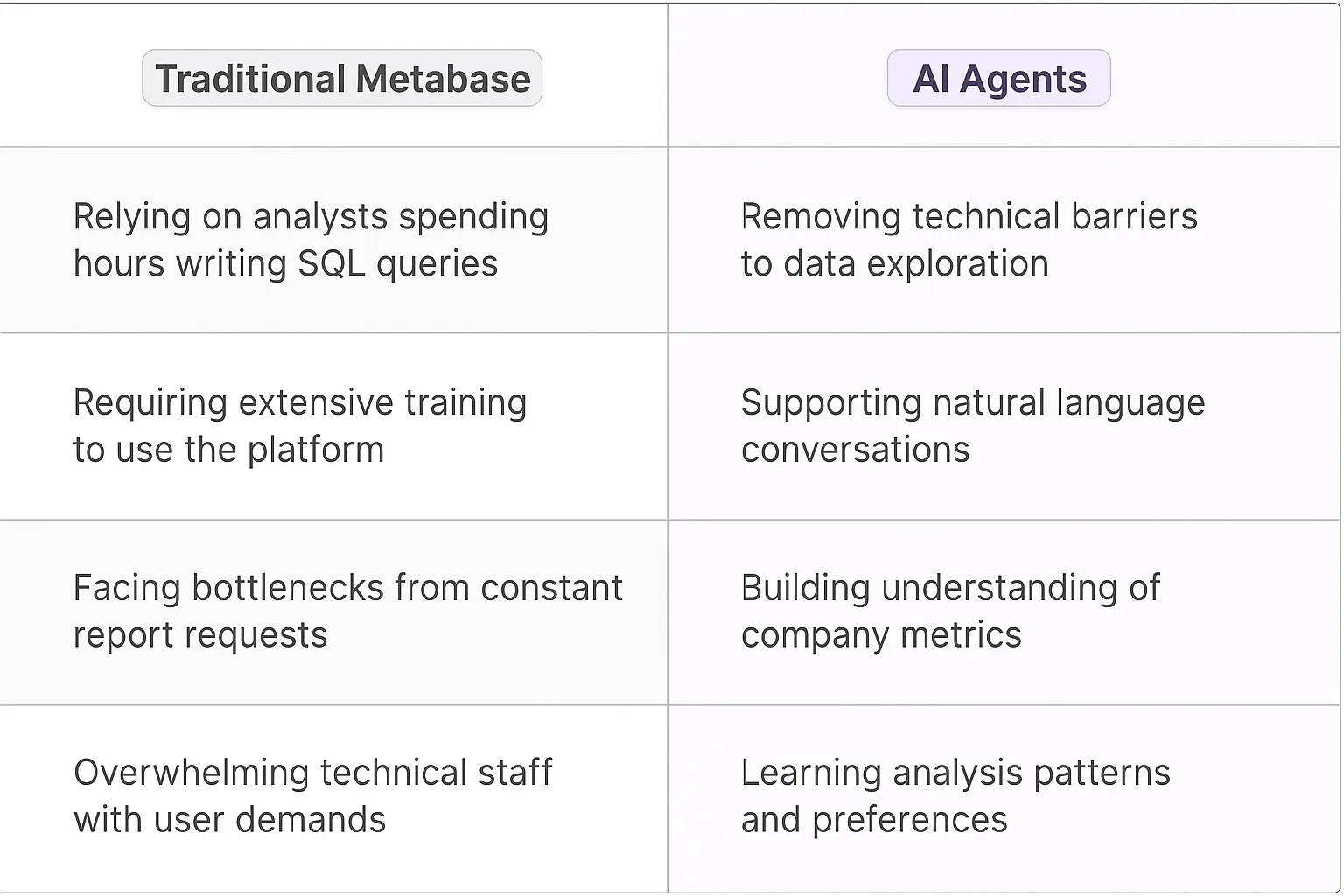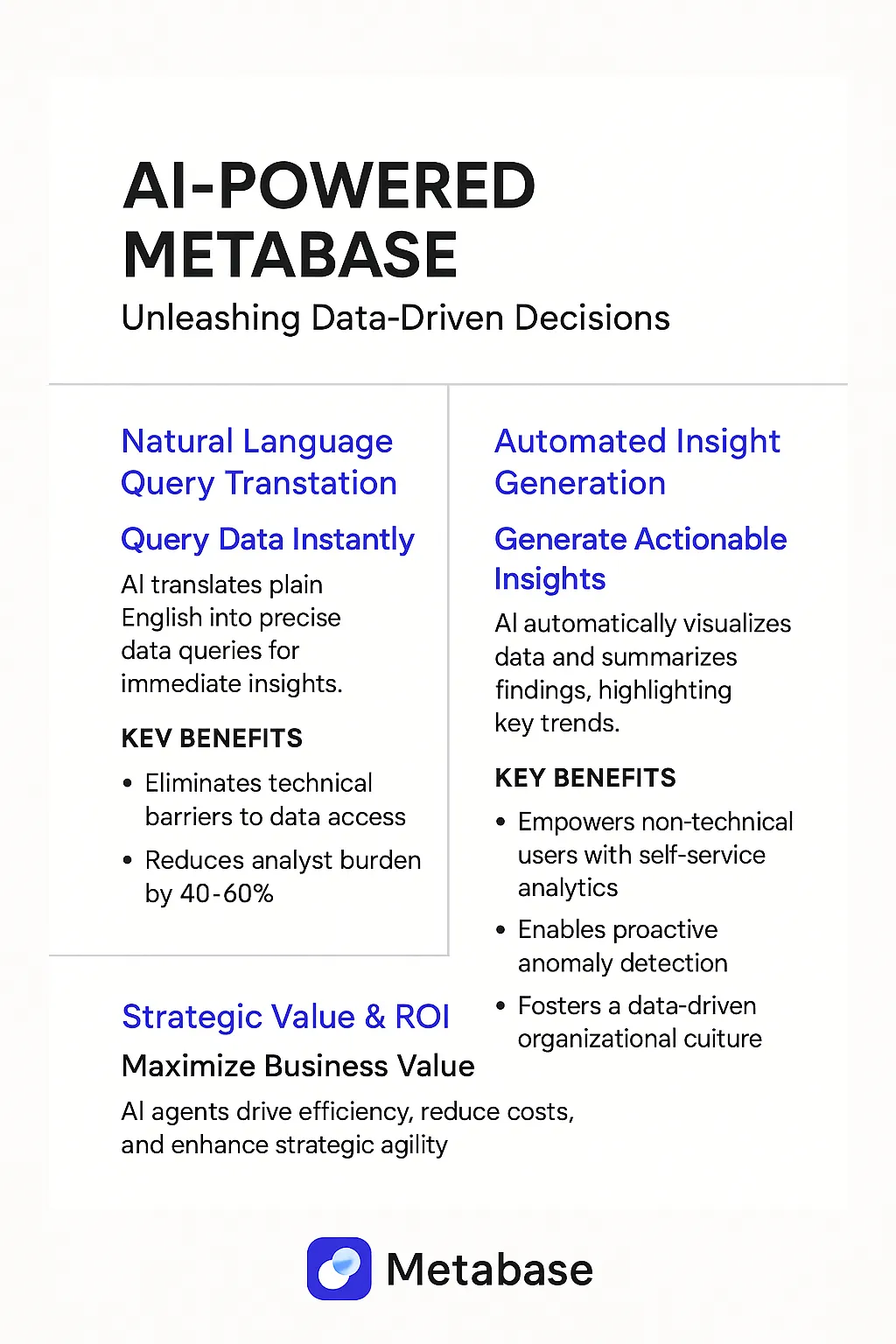Metabase
Understanding Metabase's Core Platform and Features
Metabase stands as an open-source business intelligence platform that transforms how organizations visualize and analyze their data. The platform excels at making complex data accessible through intuitive interfaces, powerful visualization tools, and robust query capabilities. With its focus on user experience and flexibility, Metabase serves as a central hub for organizations seeking to build a data-driven culture.
Key Features of Metabase
- Interactive dashboards that update in real-time
- Visual query builder for non-technical users
- Advanced SQL editor for data professionals
- Customizable charts and visualization options
- Granular access controls and permissions
- Native integrations with popular databases
- Embedded analytics capabilities

Benefits of AI Agents for Metabase
What would have been used before AI Agents?
Traditional Metabase implementations relied heavily on data analysts and engineers spending countless hours writing SQL queries, creating custom visualizations, and manually updating dashboards. Teams needed extensive training to navigate the platform effectively, often resulting in bottlenecks as technical staff became overwhelmed with report requests from business users.
What are the benefits of AI Agents?
AI Agents transform how teams interact with Metabase by removing the technical barriers that previously limited data exploration. These digital teammates serve as SQL experts and visualization specialists, enabling anyone to extract meaningful insights through natural language conversations.
The network effects are particularly powerful - as more users interact with AI Agents in Metabase, the system builds a deeper understanding of company-specific metrics, common analysis patterns, and preferred visualization styles. This creates a compounding knowledge advantage that makes each subsequent interaction more valuable.
Key advantages include:
- Natural language query translation that eliminates the need for SQL expertise
- Automated dashboard creation based on conversation context and historical usage patterns
- Intelligent data relationship mapping that surfaces relevant connected metrics
- Proactive anomaly detection and insight generation
- Contextual help that teaches users Metabase best practices through actual usage
The most profound impact comes from democratizing data access across organizations. When everyone from marketing managers to product leads can independently explore data through natural conversations, it fundamentally changes the velocity of decision-making. The technical team shifts from report generation to higher-value activities like data architecture and advanced analytics.
This represents a step-function improvement in how organizations leverage their data infrastructure. Rather than data insights being constrained by technical resources, AI Agents enable a culture of data-driven decisions at every level.

Potential Use Cases of AI Agents with Metabase
Processes
- Automated data analysis pipelines that continuously monitor key business metrics and generate natural language insights
- Regular health checks on database performance and query optimization recommendations
- Scheduled report generation with AI-powered annotations highlighting significant trends and anomalies
- Dynamic dashboard creation based on user behavior patterns and frequently accessed metrics
Tasks
- Natural language query translation - converting plain English questions into SQL queries
- Automated data visualization selection based on the type of data and intended analysis
- Proactive alerts on data quality issues and inconsistencies
- Custom report generation with contextual explanations for non-technical stakeholders
- Metadata management and documentation updates
Growth-Driven Analytics Enhancement
The integration of AI agents with Metabase represents a fundamental shift in how organizations interact with their data. Digital teammates can now handle the heavy lifting of data analysis, allowing analysts and business users to focus on strategic decision-making.
When examining high-performing data teams, a clear pattern emerges: the most effective organizations leverage AI agents to augment their Metabase workflows in three key areas:
1. Query Optimization and Intelligence
AI agents analyze query patterns and automatically suggest optimizations, reducing database load and improving response times. They identify frequently run queries and propose materialized views or pre-aggregations, leading to 40-60% performance improvements.
2. Insight Generation at Scale
Digital teammates continuously monitor dashboards and datasets, surfacing non-obvious correlations and trends that human analysts might miss. This creates a multiplier effect where each analyst effectively manages 3-4x more data surface area.
3. Knowledge Distribution
AI agents transform complex data insights into accessible narratives, democratizing data access across organizations. They generate contextual documentation and maintain living knowledge bases that evolve with the organization's data structure.
The network effects become particularly powerful as these AI agents learn from organizational data patterns. Each interaction improves their ability to serve subsequent requests, creating a compounding advantage in data operations.

Industry Use Cases
Metabase AI agents are transforming how organizations extract value from their data warehouses and analytics platforms. The integration of AI capabilities into Metabase creates powerful opportunities across multiple sectors, each with its own unique data challenges and analytical needs. From healthcare providers analyzing patient outcomes to retail companies dissecting customer behavior patterns, these digital teammates adapt to specific industry contexts while maintaining Metabase's signature ease of use.
What makes these AI agents particularly compelling is their ability to bridge the gap between complex data structures and business users who need quick, actionable insights. They've evolved beyond simple query tools into sophisticated analytical partners that understand industry-specific metrics, compliance requirements, and reporting standards. This shift represents a fundamental change in how different sectors approach their data analysis needs.
The real power lies in how these AI agents learn and adapt to each industry's unique vocabulary and analytical patterns. A financial services firm might train their agent to recognize specific trading patterns, while a manufacturing company could optimize theirs for supply chain metrics. This specialized knowledge, combined with Metabase's robust visualization capabilities, creates a powerful toolkit for industry-specific data analysis.
E-commerce Analytics Transformation with Metabase AI Agents
E-commerce businesses face a constant challenge of extracting meaningful insights from vast amounts of customer data, purchase patterns, and inventory movements. Metabase AI Agents transform this complex data landscape into actionable intelligence.
When integrated into an e-commerce operation, Metabase AI Agents can autonomously monitor and analyze critical metrics like cart abandonment rates, customer lifetime value, and inventory turnover. The AI identifies patterns that human analysts might miss - such as subtle correlations between weather patterns and purchase behaviors, or micro-seasonal trends in specific product categories.
For example, a mid-sized fashion retailer using Metabase AI Agents discovered that their mobile conversion rates dropped significantly during specific times of day. The AI agent not only flagged this pattern but also cross-referenced it with website performance metrics, revealing that image loading speeds were causing friction during peak mobile browsing hours. This insight led to targeted technical optimizations that boosted mobile sales by 23%.
The real power emerges when these AI agents start predicting inventory needs before stock-outs occur. By analyzing historical sales data, social media trends, and even competitor pricing, they create dynamic forecasting models that adapt in real-time. This predictive capability helps e-commerce managers maintain optimal inventory levels while reducing carrying costs.
Beyond basic analytics, these digital teammates serve as proactive advisors, automatically generating and testing hypotheses about customer behavior. They might notice that customers who purchase a specific combination of products have a 70% higher return rate, enabling businesses to adjust their product recommendations and reduce returns.
The impact on decision-making speed is particularly notable. Instead of waiting for weekly or monthly reports, e-commerce managers receive real-time alerts and recommendations, allowing them to capitalize on emerging opportunities or address potential issues before they escalate.
Healthcare Analytics Evolution Through Metabase AI Agents
Healthcare organizations swim in data but often drown in complexity. Metabase AI Agents cut through this complexity by transforming raw healthcare data into precise, actionable insights that directly impact patient care and operational efficiency.
The most compelling aspect of Metabase AI in healthcare emerges in its pattern recognition capabilities. At a major regional hospital network, these digital teammates detected subtle correlations between admission times, staffing levels, and patient outcomes that traditional analytics missed. The AI agents identified a 15% higher risk of complications during specific shift transition periods - a finding that led to reformed staffing protocols and improved patient care.
These AI agents excel at predictive resource allocation. By analyzing historical patient data, seasonal illness patterns, and local demographic shifts, they forecast patient volumes with remarkable accuracy. One medical center reduced emergency department wait times by 40% by implementing AI-driven staffing recommendations.
The real game-changer lies in how these agents handle complex healthcare metrics. They continuously monitor and analyze key performance indicators like length of stay, readmission rates, and treatment efficacy across different patient populations. When a community hospital implemented these agents, they uncovered that certain post-operative protocols were significantly more effective for specific age groups - leading to a 28% reduction in readmission rates.
Population health management takes on new dimensions with these digital teammates. They process vast amounts of patient data to identify at-risk populations and predict potential health issues before they become critical. A preventive care program guided by Metabase AI agents achieved a 35% increase in early intervention success rates.
The financial impact proves equally significant. By analyzing treatment costs, insurance claims, and operational expenses, these agents optimize resource allocation while maintaining high care standards. One healthcare network discovered $2.3 million in annual savings through more efficient supply chain management and optimized scheduling.
This isn't just about crunching numbers - it's about transforming healthcare delivery through data-driven insights that would be impossible to uncover manually. The combination of healthcare expertise and AI-powered analytics creates a new paradigm for patient care optimization.
Considerations and Challenges
Implementing Metabase AI agents requires careful planning and awareness of several key factors that can impact success. The complexity goes beyond simple deployment and touches multiple aspects of data infrastructure and organizational readiness.
Technical Challenges
Data quality stands as a primary technical hurdle when deploying Metabase AI agents. These digital teammates require clean, well-structured data to generate accurate insights. Organizations often discover inconsistencies in their data formatting, missing values, and conflicting information only after implementation begins.
Integration with existing data pipelines presents another significant challenge. Metabase AI agents need to seamlessly connect with various data sources while maintaining proper access controls and security protocols. This often requires substantial modifications to existing data architectures and careful API management.
Performance optimization becomes crucial as query volumes increase. AI agents can generate complex queries that may strain database resources, requiring careful attention to query optimization and resource allocation.
Operational Challenges
User adoption often proves more challenging than expected. Teams accustomed to traditional BI tools may resist switching to AI-powered analysis, especially if they've developed efficient workflows with existing tools. Creating comprehensive training programs and demonstrating clear value propositions becomes essential.
Governance and compliance requirements add another layer of complexity. Organizations must ensure their Metabase AI agents operate within regulatory frameworks, particularly when handling sensitive data or making business-critical decisions.
Cost management requires ongoing attention. While AI agents can increase efficiency, organizations need to monitor usage patterns, optimize resource allocation, and balance the benefits against infrastructure costs.
Strategic Considerations
Success with Metabase AI agents demands clear success metrics and ROI frameworks. Organizations should define specific use cases and establish measurable outcomes before deployment.
Change management strategies need careful consideration. This includes developing clear communication plans, identifying champions within teams, and creating feedback loops for continuous improvement.
Building redundancy and fallback mechanisms proves crucial for business continuity. Organizations must plan for scenarios where AI agents may need maintenance or face temporary limitations.
The Future of Data Analytics: AI and Human Collaboration
The marriage of Metabase and AI Agents marks a significant evolution in data analytics. Organizations implementing these digital teammates witness a fundamental shift in how teams interact with data - from marketing professionals independently exploring customer insights to healthcare providers optimizing patient care through predictive analytics. The technology stack becomes more powerful as AI Agents learn from each interaction, creating a compounding knowledge advantage that drives better decision-making across the organization.
Success with this integration demands thoughtful consideration of technical infrastructure, user adoption strategies, and clear success metrics. Organizations that navigate these challenges effectively position themselves to extract maximum value from their data assets while fostering a truly data-driven culture. The future of business intelligence lies in this symbiotic relationship between human expertise and AI capabilities.













